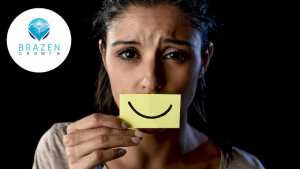Perfectionism in psychology is defined as a personality trait in which a person strives for ‘flawlessness’. This striving is accompanied by setting high performance standards, being self-critical and a concern for what other’s perceptions of you are.
The Positives and Negatives of Perfectionism
The positive side of this personality trait is that it can motivate a person to strive for goals. The negative side is that combined with many other factors that can influence our thoughts and behaviours, the striving for unattainable goals can create a complex mess of anxiety, depression, shame and guilt. Research has shown that perfectionism may be both a risk factor and a maintenance factor for eating disorders, particularly anorexia nervosa and bulimia nervosa, and other mental illnesses. Ironically, those that suffer from eating disorders often disregard all of their other life goals and ambitions and the focus of their life is around food and compensatory behaviours.
It has also been shown that those who had previously suffered anorexia and had restored body weight, still had higher scores on perfectionism than control groups. This shows that this trait is not only related to attaining an ‘ideal’ body size or shape. Similarly, the level of perfectionism had little significance on impacting recovery from anorexia or bulimia.
Many facets of perfectionism
- Personal Standards
- Criticism from parents
- Concern over Mistakes
- Expectations from others
- Perceived perfection in society
Not ‘good enough’
When we are driven by a fear of not being ‘good enough’, perfectionism can have devastating consequences for individuals. Mental, social and physical health is compromised as our self-worth is affected. The many rigid rules that accompany eating disorder behaviours set a framework for the sufferer to live by and their sense of worth is based around adhering to these. The rules become their personal standard. For me, adhering to these rules meant that I felt I was worthy to warrant my parent’s affections when for many years I felt that I was not ‘good enough’ to be listened to or loved. This was a false belief I had but it drove my behaviour. It also formed a foundation of people pleasing and seeking approval from others.
I became self-critical if I broke the rules I formed regarding restricted eating and excessive exercise. If I ‘slipped up’ then I was a failure. Shame and guilt strengthen these behaviours. The binge-purge cycle is driven by guilt and shame. The eating disorder was a means of control of the emotions I felt about not being a ‘good enough’ daughter. For me, It did not begin with anything to do with body weight yet became a fear of gaining weight and maintained by the notion that I was not ‘good’ enough for my parents. This belief that I was ‘not enough’, influenced behaviours for most of my life.
Media and Perceived Societal Expectations
The complexities of eating disorders are many as is their development. There were no social media posts when I suffered anorexia. There are now over 45 million posts under the #Fitspo or fitness inspiration. For the vulnerable and those striving to attain an expectation of perceived perfection these posts scream a number of ‘should’s and ‘shouldn’ts’. Eat this. Don’t eat that. Don’t eat that then. Exercise like this and at this time. The list goes on all in order to be a ‘better version of yourself’. The trouble is that for a person that is forever striving to achieve that state of perfection, it does not come. These images provide a constant platform for comparison with the view a sufferer has of themselves. The number on the scale either has to plummet to a new low or the cycle of binge and purge continues or people give up on looking after themselves in a balanced and healthy manner.
Perfection does not exist
The Dove Evolution clip shows the expectations and ideals of perfection that are portrayed are not even real. Many images of bodies on social media are also often sexualized. When self-worth (self-image) is strongly connected to what you feel about your body (body image), this may also affect the way we portray ourselves sexually. Promiscuity or abstinencecould result, either way affecting our relationships. Many images on pro ana sites, where people encourage anorexia behaviour, are sexualised.
Is this a reflection of attempting to attain societal ideals of ‘perfection’ and beauty or crying out for the real need to be loved and thinking that sex will provide that? The trouble is that this can result in more disappointment as shame and a sense of failure then strengthen unhealthy behaviours. This quote is taken from a pro ana site and shows how dangerous feeling inadequate and self-hating can become. Anonymous: “I believe that I am the most vile, worthless an useless person ever have to existed on this planet, and that I am totally unworthy of anyone’s time and attention. I believe in ought s, musts and should s, as unbreakable laws to determine my daily behavior. I believe in perfection and strive to attain it.”
This is not vanity. It is the cry of someone that has lost sight of how to exist any other way. It is a prison as a means of control of feelings of unworthiness. We copy and paste behaviours trying to attain a better version of ourselves, covering up our ‘flaws and mistakes’ and often lose sight of who we are in the process. This is not an example of health. Health starts with loving who you are. If what we think of ourselves is not positive, then our physical, emotional, mental and social health suffers. What is perfection and what is imperfection? According to whose opinion? Maybe it will come when we eliminate self-criticism or stop criticising others in an attempt to feel better about ourselves. No comparison, no shame, no blame. Just accept, learn and be.
Read my blog on shame here
If you or anyone you know is needing help for an eating disorder you can contact:
Alternatively, contact me at info@brazengrowth.com.au



